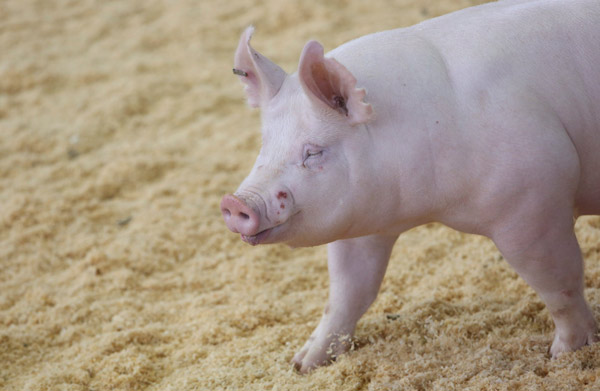US pork industry feels effects of China's ban on some imports
Updated: 2014-08-19 08:15
By JACK FREIFELDER in New York(China Daily USA)
|
||||||||
|
 A pig walks on the show floor at the 2014 World Pork Expo in Des Moines, Iowa June 4, 2014. [Photo/Agencies] |
China's decision to bar the import of pork products from a dozen US facilities is "certainly a shock to the market", according to one analyst.
But the decision could help the US solve "a bit of its supply problems in the short-term", said John Payne, a senior market analyst with Daniels Ag Services in Chicago.
"Domestic pork production (in China) is up through the first quarter of the year, and their supply might just be high enough where they can shut things down for the short-term," Payne said Monday in an interview with China Daily. "Demand is somewhat static right now, even with this China news."
"The supplies in the US are so tight that this won't make much of a dent," he said, "and things should be able to work themselves out."
China enforced a ban on pork imports from six US cold storage facilities and six US processing plants last week.
The pork restrictions stem from the presence of ractopamine, a common non-hormonal feed additive that slows an animal's metabolization of fat.
Included among the processing plants affected are: three Tyson Foods Inc facilities, two in Iowa and one in Indiana; a Hormel Foods Corp plant in Fremont, Nebraska; Triumph Foods in St Joseph, Missouri; and Quality Pork Processors Inc in Austin, Minnesota.
Tyson Foods spokesman Gary Mickelson told China Daily: "We're confident about the safety and quality of our pork and will work with the USDA to resolve China's concerns. In the meantime, we'll find other markets for our products."
China banned exports and imports of several additives, including ractopamine in 2009, according to a Aug 14 report by the China News Service.
Since March, third-party authentication has been required in China to verify that US pork shipments are ractopamine-free.
James Robb, director of the Denver-based Livestock Marketing Information Center, said: "China is producing plenty of pork to fulfill their domestic needs, and they have been buying from the US when prices have been attractive.
"China can be a swing buyer and that does impact the meat and poultry markets," Robb said.
Imports of US pork to the Greater China Region in 2013 totaled nearly 420,000 metric tons, an equivalent value of more than $900 million, making the region the third-leading export market for US pork.
Overall US pork exports totaled 2.14 million metric tons, valued at more than $6 billion, according to data compiled by the US Meat Export Federation.
Dave Warner, director of communications for the Washington-based National Pork Producers Council (NPPC), said: "Pork is the No 1 meat of choice around the world by far over beef and chicken."
He also said despite recent developments NPPC data shows that pork exports through June were up year-over-year, so the industry is well on its way toward "another record year for US pork exports".
"US pork exports have set records in 20 of the last 22 years, so exports are still good," he said Monday in an interview with China Daily.
No timetable has been set for the bans on these specific facilities.
jackfreifelder@chinadailyusa.com

 Former Microsoft CEO Steve Ballmer leaves board
Former Microsoft CEO Steve Ballmer leaves board
 Top 10 most attractive Chinese cities at night
Top 10 most attractive Chinese cities at night
 Missouri governor lifts Ferguson curfew
Missouri governor lifts Ferguson curfew
 Rebuilding lives
Rebuilding lives
 US dominates Chinese world university rankings
US dominates Chinese world university rankings
 Residents caught giant alligator in Alabama
Residents caught giant alligator in Alabama
 Chinese biotech company rings closing bell at NASDAQ
Chinese biotech company rings closing bell at NASDAQ
 China can upgrade US transport
China can upgrade US transport
Most Viewed
Editor's Picks

|

|

|

|

|

|
Today's Top News
Antitrust probes 'won't deter investors'
Obama vows long-term strategy against ISIL
Ministry says trade growth needs help to reach 7.5%
Xi pledges to make China media more up to date
Missouri gov lifts Ferguson curfew
US police uses China's social media
China's US debt holdings dip lower, again
Anti-trust team lacks real muscle for enforcement
US Weekly

|

|







